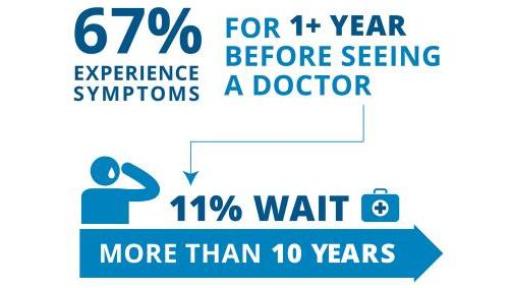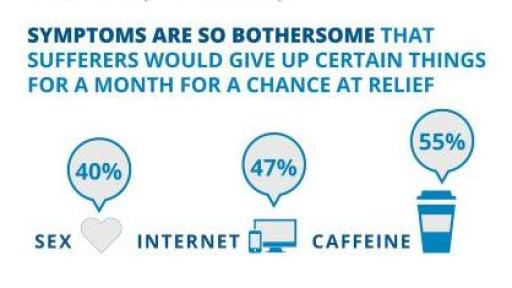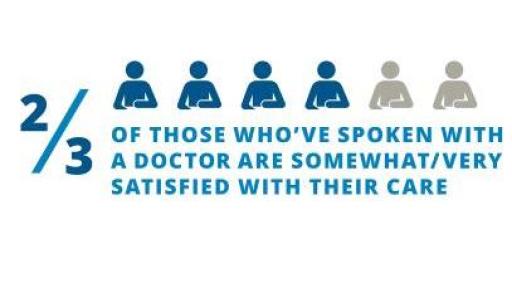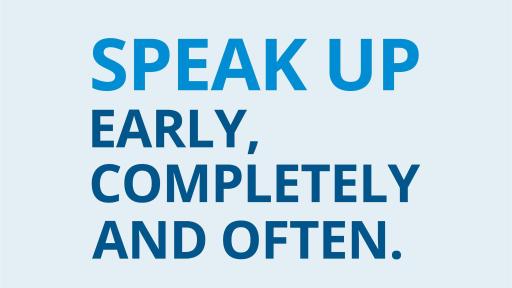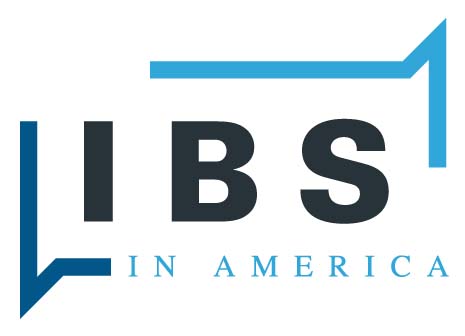IBS in America: Survey Highlights Physical, Social and Emotional Impact
American Gastroenterological Association’s National Survey Demonstrates Burden of IBS and Need for Better Communication Between Doctors and Patients
PR Newswire, Bethesda, MD (Dec. 14, 2015)
Irritable bowel syndrome (IBS) significantly impacts patients’ daily lives; a new survey found symptoms can be so bothersome that many people would give up caffeine, their cell phone or internet access, or even sex for one month for the chance to obtain a month’s relief from IBS symptoms. Today, the American Gastroenterological Association (AGA) released results from the “IBS in America” survey, the most comprehensive IBS survey ever conducted of patients and physicians, which looks at the physical, emotional and social impacts of this condition.
Survey Highlights
IBS is estimated to impact nearly 35 million Americans and causes recurring abdominal pain and constipation or diarrhea. Critical insights from the “IBS in America” survey, which polled more than 3,200 IBS sufferers and 300 health-care providers, include:
- Replace Speculation with Science: Many people who suffer from IBS symptoms are getting — and following — advice from their family and friends.
- A majority of the IBS sufferers surveyed (67 percent) report experiencing abdominal and bowel symptoms for more than a year before even talking with a doctor, while some (11 percent) wait a decade or more.
- Yet eight in 10 respondents (85 percent) have discussed IBS with someone in addition to a doctor — primarily their family or friends. A majority (59 percent) said they receive advice from these folks, and nine in 10 say they have followed this advice.
- Recognize the Daily Burden: Symptoms like abdominal pain, constipation, diarrhea, bloating or cramping can impact people more than just physically, but also emotionally and socially.
- Most respondents (52 percent) said their symptoms were extremely/very bothersome — so much so that they would give up caffeine (55 percent), their cell phone or internet (47 percent) or even sex (40 percent) for one month for the chance to feel one month of relief.
- Seven in 10 respondents reported suffering from common IBS symptoms at least two to three days per week, and nearly one in four (22 percent) report they are “not at all” able to accurately predict if they will experience symptoms on any given day. IBS symptoms interfered with their productivity and performance, on average, nine days each month, and caused those respondents to miss school/work two days per month, on average.
- 75 percent of sufferers reported feeling frustrated and/or depressed.
- From Self-Help to Communication: Talking to the right person (i.e. a doctor rather than a best friend) is half the battle; the other half is having an honest, open conversation and telling a health-care professional what they need to know to help.
- Before they saw a doctor, 77 percent of sufferers reported they tried, on average, more than three over-the-counter (non-prescription) products, but relatively few reported being “very satisfied” with these products (less than 20 percent for non-prescription anti-diarrheal products; less than 15 percent for non-prescription laxatives).
- The doctor-patient conversation could be improved. In fact, when physicians were asked what is most lacking in the treatment of IBS, the second-most-common answer was communication between doctors and patients (38 percent).
- This stuff is HARD to talk about — respondents report bowel movements are even more uncomfortable to discuss with others than sexually transmitted diseases. The good news is that once IBS sufferers talk to a doctor, two-thirds (65 percent) report they are satisfied (somewhat/very) with the care they receive.
“IBS is an important health-care priority — it is the seventh most common diagnosis made by all physicians and the most common diagnosis made by gastroenterologists. People who suffer from abdominal pain and bowel symptoms are not alone,” said Michael Camilleri, MD, AGAF, president of AGA. “Talking about bowel function habits is never easy, but it is concerning to see how long the respondents in this survey often waited to talk to a doctor. There may not be a cure for IBS, but there are treatments. Patients need to see a doctor, and doctors need to be proactive in bringing up this topic in conversation with the patient.”
Anthony Lembo, MD, Harvard Medical School and Beth Israel Deaconess Medical Center, Boston, and a co-author of the survey, stated, “The ‘IBS in America’ survey gives voice to the experience of people suffering from this condition in a way I have never seen before. Understanding what people would be willing to give up for one month — including sex or caffeine — in exchange for one month free of IBS symptoms is a powerful illustration of just how much they are suffering.”
Andrea Shin, MD, practicing gastroenterologist and assistant research professor, Indiana University, and a co-author of the survey, added, “The finding I was most surprised by in this survey is how often sufferers take advice from families and friends given that IBS affects everyone differently — what worked for one person may not work in another, so it’s critical that patients work with a doctor to manage their own disease.”
AGA recommends three steps to improve doctor-patient communication:
- Speak Up Early: Instead of suffering in silence or taking advice from people who aren’t health-care professionals, talk to a doctor about recurring abdominal pain and bowel symptoms.
- Speak Up Completely: Instead of just saying “I have constipation” or “I have diarrhea,” tell a doctor about the full extent of symptoms, how they impact life, and what approaches have already been tried to manage them.
- Speak Up Often: Tell a doctor if symptoms return despite treatment efforts so they can assess alternatives.
With this feedback, doctors are more likely to be able to help their patients navigate their own IBS treatment path.
The full survey results are available at IBSinAmerica.gastro.org and Dr. Shin will participate in a webcast on Thursday, Dec. 17 from 1p.m. to 2p.m. ET, moderated by Kara Gross Margolis, MD, Columbia University, during which the results will be discussed. Register here. Follow and join in the discussion with the hashtag #IBSinAmerica.
About IBS
A chronic condition, IBS consists of a constellation of gastrointestinal (GI) symptoms, such as abdominal pain, constipation, diarrhea, gassiness, bloating or cramping. Some people experience IBS with constipation (IBS-C), which is characterized by abdominal pain and difficult or infrequent bowel movements, while others experience IBS with diarrhea (IBS-D), characterized by frequent loose stools or an urgent need to move the bowels. Others alternate between constipation and diarrhea. While IBS cannot be cured, symptoms can be managed. Treatment strategies are based on the nature and severity of symptoms, as well as identification of the disturbance of function, and may include diet or lifestyle modifications, over-the-counter products or prescription medicines.
About the Survey
The “IBS in America” survey was commissioned by the American Gastroenterological Association and conducted with the financial support of Ironwood Pharmaceuticals, Inc. and Allergan plc. Online surveys were conducted by GfK, a leading market research company, Sept. 14 through Oct. 29, 2015. In total 3,254 IBS sufferers, both diagnosed and undiagnosed, were interviewed, as well as 302 physicians who treat IBS patients — 151 primary care physicians and 151 gastroenterologists.
About the American Gastroenterological Association (AGA)
The American Gastroenterological Association is the trusted voice of the GI community. Founded in 1897, the AGA has grown to include more than 16,000 members from around the globe who are involved in all aspects of the science, practice and advancement of gastroenterology. The AGA Institute administers the practice, research and educational programs of the organization. www.gastro.org.
About GfK
GfK is the trusted source of relevant market and consumer information that enables its clients to make smarter decisions. More than 13,000 market research experts combine their passion with GfK’s long-standing data science experience. This allows GfK to deliver vital global insights matched with local market intelligence from more than 100 countries. By using innovative technologies and data sciences, GfK turns big data into smart data, enabling its clients to improve their competitive edge and enrich consumers’ experiences and choices. www.gfk.com
###



